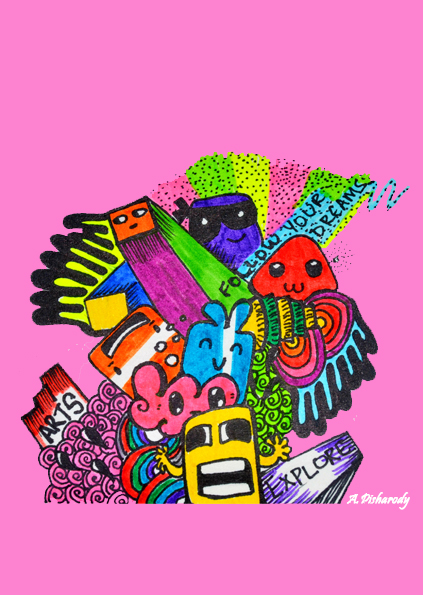A fine Sunday morning, three students walked past three identical white lilies in a luscious garden.
The Science student plucked the petals of the lily to understand it better… for research.
The Commerce student plucked the lily to sell it at the local farmer’s market… for profit.
The Arts student left the lily untouched, gazed at it for a long while, appreciated its beauty, and understood its place in the garden. He then constructed a poem about the lily which made him richer than Bill Gates [Well, not really].
As someone who has opted for Arts in a C.B.S.E school, I’m often faced with random comments such as
- “Oh, you guys must have a lot of free time” or
- “Arts is so easy, no wonder your percentages are high”
- “What are you going to do with an Arts degree? Become a librarian?”
No, guys. No. I think I speak not only for myself, but every student in the Arts stream that not only is that highly untrue but insanely absurd; our percentages are high because we study hard and we love what we do.
The reason for these accusations:
I don’t really blame the people making these accusations; the stereotype has been so deeply embedded in the Indian culture, that we’ve been unconsciously pushed towards opting for Science or Commerce. It’s a common Indian belief that Arts degrees were for people who didn’t want to do anything productive with their lives; that Arts students were the lazy, non-contributing, intellectual wastage of a modern society. Hearing these common notions, I admit to being a little hesitant when I opted for Arts in the 11th grade. Contradictory to the numerous warnings from those around me, I don’t regret picking Arts one bit.These subjects taught me to think critically, it allowed me to explore my creative side and I got to take part in heated discussions about things I wouldn’t usually care for.
With all due respect to students of the other streams, Arts students have a knack for bringing forth issues others conveniently sideline. We’re taught to be analytic, thoughtful and observant, whether it’s familiarity to Shakespearean English, knowledge of the Mesopotamian civilization or an understanding of the relationship between individuals and the state.

Here are 4 reflections clarifying the relevance of the subjects we study [I find it absurd that these need to be pointed out]:
1. Feeding the mind: Arts students have a thorough understanding of subjects that enable us to live life wisely: Like learning Aristotle’s ideas of ethics and morality, the psychology that contributes to what makes you angry, disinterested, joyous, passionate, and above all, they have the ability to appreciate aesthetics.
2. Politics: We live in a society where politics make up a huge part of the way we live- how much water we get in our houses, how much we pay for electricity, how long we get to spend with our parents [How long they stay at the office]. The U.A.E, for instance, lets their residents live tax-free, which you may not realise.. is a huge blessing, partially because it isn’t a full-fledged democracy.
These are questions that are the base of the study of Politics [It isn’t all about corrupted politicians and names of competing parties. There’s reason in the mayhem].
3. History: If there’s one thing history teaches you, it is to learn from past mistakes[That means never to wear a white t-shirt out when there’s a chance of rain]. But further reflection will show you that even the Cold War isn’t simply a remote event in history: It is an integral cause of our lives now. Captain America wouldn’t have been as awesome as it was without it. U.S.A wouldn’t be tiptoeing around Middle Eastern countries, snooping the whole time.
The Space wars that were heavily funded at the time helped us know a lot that we know about the Universe now. Most of all, our favorite things – Whatsapp, the iPhone, the internet – were all made possible because during the Cold War, there was a huge burst in communications technology.
4. Literature and Fine Arts: The stuff you live and breathe – your favorite television shows, the most mesmerizing movies and all the playlists on your iPod came from people who were passionate about the arts.
Granted, it is a combination of technology and art that has made the experience of our generation possible, but without creativity, the four dimensional humanity of Sherlock and Watson, the moral ambiguity of the Lannisters and the heart-wrenching scene where The Doctor says goodbye to his companion would not have had quite the same effect.
Arts isn’t for everyone, but for those considering a launch into the vigorous world of passion and intellect, don’t let the stereotypes keep you at bay. The expectations of polite society, our parents, our relatives, our teachers and even our neighbors might unconsciously steer us toward a stable job in a noble profession, but remember this: rarely does a degree guarantee you a job no matter how specialized it is.
All of this may sound very pretentious coming from an eighteen-year old in her second school year of Arts but I know enough to say that for the love of any deity in which you believe, if any at all, follow your passion and the rest will come.
P.S: Remember, for now and forever to come.. ‘Art’ is not synonymous with ‘lazy’ or ‘pretentious’.










